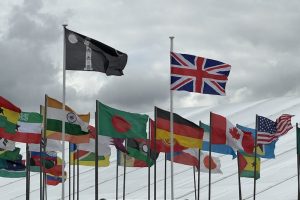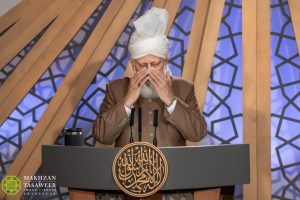The Review of Religions conducted an interview with respected Rafiq Ahmad Hayat, National President of the Ahmadiyya Muslim Association UK, on the topic of how the Community is dealing with the current Covid-19 pandemic. During this interview he spoke about how the community is operating during this time, under the direct guidance of the Caliph (aba), the various services which the Community is providing to its members and those working on the front lines, as well as his message to those who have been affected by this pandemic. Below is a lightly edited transcript of the interview between respected Rafiq Ahmad Hayat and the Review of Religions‘ Danyal Arif.
DA: Respected Amir Sahib, Assalamu alaikum (peace be upon you) and welcome.
AS: Assalamu alaikum wa rehmatullahi wa barakatuhu (peace and blessings of Allah be upon you), and JazakAllah (God bless you) for asking me to help you with this Covid-19 crisis here in the UK.
DA: Thank you very much for joining us on this programme and to grant us a little of your precious time. So, if I can start off by asking you: During this critical time of the Covid-19 pandemic, can you give us a summary of the activities that the UK Jama’at (community) has been involved in order to help the wider society?
AS: Yes. Firstly, can I say that by the grace of Allah, we are blessed with the institution of Khilafat. And Huzur-e-Aqdas (His Holiness (aba), at the very start, gave very detailed instructions to the Jama’at on how we need to conduct ourselves during this very difficult period of the crisis of Covid-19.
Huzur-e-Aqdas (aba) firstly instructed us that we should follow the strict guidelines issued by the government and the public health authorities in terms of the Covid-19. And therefore, in order to be able to do that we had to ensure that social distancing had to be observed. The guidelines in respect to mosques being closed were also being observed. Huzur (aba) then said that we should hold congregational prayers at home and also the Friday prayer should be offered in our homes with first listening to the address of Huzur-e-Aqdas (aba), and then having a local Khutba (sermon). And then Huzur (aba) instructed that all the good hygiene practices should be thoroughly observed in our homes. And then Huzur (aba) went on to say that we should serve the country and the vulnerable people in our society in the best way possible, and that Khuddam (youth auxiliary organization) and the Jama’at should contact the local authorities and offer help to the local authorities in every way possible.
So by the Grace of Allah, all of these detailed instructions by Huzur-e-Aqdas (aba) have been thoroughly followed, and by the Grace of Allah our Khuddam and Ansar (auxiliary organization for those aged forty and above) and Lajna (women’s auxiliary organization) teams have been working with local authorities in providing all kinds of services. We have been asked to help with the vulnerable people in societies so our Khuddam and Ansar are visiting various homes and helping with deliveries inside and outside the Jama’at.
Huzur-e-Aqdas (aba) had further given some guidance as to the homeopathic medicine that should be used by all members of the Jama’at, and in this respect, every household has been delivered with this homeopathic medicine, and by the Grace of Allah, all Ahmadis throughout the UK and indeed I am sure throughout the world are benefitting from this homeopathic remedy, a preventative remedy.
In terms of the activities within the Jama’at itself, by the Grace of Allah, in line with Huzur’s (aba) guidance, we gave instructions to all our presidents that every member of the Jama’at should be contacted on a regular basis, daily if possible, to find out firstly about their health and secondly about what, if anything, they require in terms of deliveries of food or whether it is delivery of medication. There are lots of vulnerable people in the Jama’at and it was to ensure that every member received every possible help during this difficult period. Then, especially the elderly people in the Jama’at, some of those who may not be able to cope or may be unwell during this period, the presidents were instructed that arrangements should be made that food should be delivered to these people and they should be looked after properly, at all times observing the social distancing instructions.
Then because we have a lot of children who are at home, schools have closed, so we were concerned about both the academic and spiritual education about our children during this period. So on that basis, with the blessings of Hazrat Ameer-ul-Mu’meneen (aba), classes have been started both in terms of academic lessons and also in terms of the spiritual teaching and regular classes are now taking place, well over 1,000 students have registered for various courses and so far we have almost 7,000 courses that have been registered for by these young children.
Then, we were concerned during these difficult times, a lot of people lose their jobs, and we wanted to see how we could help them. In this respect, our San`at-o-Tijarat team then started organizing various courses for people to retrain so that they could either change the course of their employment, and therefore they could find new type of work by retraining. And Alhamdolilah, so far, almost 500 people are benefiting from this facility. Also, people are ringing the Sanato-Tijarat (Industry and Trade) team to find out about what assistance they can have during this very difficult period. There is some assistance that the government is providing and then there are other avenues that can be explored for businesses who are struggling and we are giving as much advice as we can in these very difficult circumstances.
So, these were some of the initial measures that we have been taking.
DA: Most specifically, Amir Sahib, about the community’s mosques: what impact has the pandemic had on the day to day running of the community’s mosques and communal activities?
AS: Well, in line with the government’s guidelines, as soon the government gave the guidelines that all mosques should stop having congregational prayers and activities within the mosques, immediately, in line with the instructions of Hazrat Ameer ul Mu’mineen, all mosques in the UK have been closed. The only area where we have maintained some activity is in the kitchens because we are cooking food for, for instance, we are working with the various hospitals and we are delivering food to NHS staff in various hospitals, and this food is being cooked in our kitchens. Also, we prepare food for the vulnerable within the Jama’at, and also other people outside the Jama’at, and we are providing that service as well.
DA: So, the community is then very organized! Do you think that the pandemic has made us change our behaviors in more positive ways?
AS: Oh absolutely! I think a lot of change has taken place. The fact that people have had to stay at home for the last 6 weeks has brought about a lot of change in people’s daily lives. I think the fact that people have more time to spend with their family and to reflect on the purpose of life, has improved the spiritual status of all the Ahmadis certainly in the UK and throughout the world. Basically, what is now happening is the daily routine in the home is that five congregational prayers are being offered in almost every household in the UK, then the Dars (lesson or reading from literature after prayer) is also being observed in every household in the UK. And particularly during Ramadan I think we have as a Jama’at organised that Dars is being made available, of Hadith and the Holy Quran, and this is on a daily basis sent to every household so that in the morning after Fajr (pre-dawn prayer) they are able to listen to Dars-e-Hadith and then after Zuhr (early afternoon) prayers they can have Dars-e-Quran. And we are also recommending, because at the moment there is Dars on MTA and some very good programmes (Rah-e-Huda and Fiqh-e-Masial), which during this period I think people would find very very useful.
In terms of, also the fact that people have become more conscious that we need to develop our relationship with Allah the Almighty during this very difficult period, so I am finding that, I’m getting very good feedback from the Jama’ats that people are supplicating to Allah and developing that relationship with Allah the Almighty.
The second injunction is that we need to care and lookafter the vulnerable people in society, and by the Grace of Allah, you see our Khuddam and Ansar and Lajna all working very hard to help in every way possible, both Jama’at members and outside the community especially. And, you know, aid is being delivered to every part of the country where vulnerable people are. We are coordinating with the NHS in terms of providing aid to different people, providing food to different people, we are providing food to the NHS frontline staff, who are doing a tremendous job putting their own lives at risk and helping those who are in great need of their help. Don’t forget we have a large number of Ahmadi doctors and nurses and other staff who are also on the frontline and they are giving great service to this community and this country, in terms of their dedication to helping the vulnerable people in our society. And then, our teams, particularly Lajna, are making PPP equipment that can be used by the NHS. A lot of masks and scrubs, are being prepared (sewn) in different homes which will be delivered to both the NHS and also to the care homes, and by the grace of Allah, this has already started and a number of care homes have already had deliveries in this respect.
DA: Respected Amir Sahib, as the holy month of Ramadan is taking place during the pandemic, what guidance has His Holiness (aba) given in terms of fasting?
AS: Huzur (aba) said that, by the grace of Allah, the month of Ramadan is starting in the UK tomorrow and that is on Saturday. This month has been established for our spiritual progress. God Almighty says that Fasting is prescribed for you as that you may attain Taqwa; His righteousness, The Promised Messiah (as) states that it is the recognition and the fulfillment of one’s rights to God and ones right to humanity. So Huzur (aba) then went on to give us some quotations from the writings of the Promised Messiah (as) as to how one can improve their Taqwa (righteousness) and attain closeness to Allah the Almighty. And then Huzur (aba) said that imagine how beautiful the society would become if people fasted in this spirit, a society where the rights of God would be fulfilled and the rights of humanity would also be fulfilled. Islam says that do not merely seek your own benefits and rights but also consider the rights of others. And Huzur (aba) went on to say that during this pandemic the members of the Jama’at have been serving humanity. He mentioned in particular the auxiliary organisation Majlis Khuddamul Ahmadiyya helping those in need. This spirit which has come about should not be limited to times of emergency but should remain at all times.
Then Huzur (aba) said that, with regards to fasting, he had been asked by a number of people whether fasting is still incumbent in light of the current circumstances and the increased risk of illness. And Huzur (aba) said that everyone should analyze their own condition and make their own judgement. And he said that he had consulted many doctors around the world on this matter, and their opinion is divided. They say that there is no specific evidence to suggest that fasting should make one more prone to illness, however if there are any indications or symptoms of illness then one should stop fasting right away. Huzur (aba) advised to drink a lot of water at the opening and closing of fasts, and if possible, eat such foods that help retain water. Huzur (aba) said to pray to Allah for the ability to fast and may Allah enable people to recognize Him, may Allah eradicate this pandemic quickly and have mercy on the world, may many Ahmadis fulfil the rights of God and humanity and benefit from the blessings of Ramadan.
So, this was the summary of the Khutba (sermon) that Huzur (aba) delivered.
DA: Finally, what message would you give to those who have loved ones who are currently suffering from Covid-19 and to those who have lost loved ones?
AS: Yes, we are monitoring on a daily basis throughout the UK those people who have suffered. Some probably have had the virus without even finding out, so they will be carriers without even knowing. They are called “silent carriers”. And there are others who have had some signs of weakness but not the full-blown illness, and have Alhamdulilah (all praise belongs to Allah) recovered. And then there is a third category who unfortunately have been hospitalized as a result of the coronavirus. By the Grace of Allah, a number of them have now recovered and are back to normal health. But unfortunately, we have lost a number of very prominent members of the Jama’at during this very difficult period. And I pray Inna lilahi wa inna ilayhi rajioun (to Allah do we belong and to Him shall we return), our prayers are that may Allah rest their souls in peace and grant solace to their families. It is indeed a very difficult period for everyone, it is a difficult period for all the worldwide community. And of course, we are hearing every day on our screens that people are dying throughout the world. So this is a time now to supplicate to our Creator, and seek His forgiveness and create a very close relationship with Him, and ask Him to forgive us and save us from this very big disaster that is taking place, that we may continue to supplicate to Him and fulfill the purpose of our life of developing a relationship with our Creator. And I pray that during this month of Ramadhan especially, may Allah enable us to get closer to Him and to develop a relationship with Him, and hopefully insha’Allah (God-willing), through this process, we will be able to see that this crisis passes over and we get back to our normal life again.
DA: Ameen! Jazak’Allah Respected Amir Sahib. I don’t think I have anything to add. Thank you very much Respected Amir Sahib, on behalf of the Review of Religions we really appreciate the time you gave us and your participation for this programme.
AS: Jazak’Allah. Allah bless you.




Add Comment